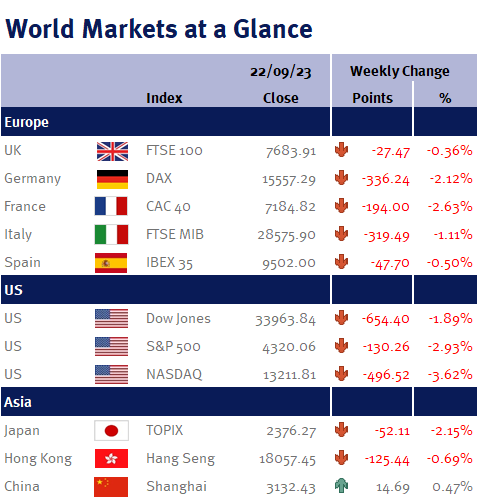The expectation that the Federal Reserve would keep short-term rates at elevated levels for an extended duration, coupled with encouraging signs of strong economic growth, caused longer-term treasury yields to soar, with the 10-year US Treasury yield reaching its highest point in 16 years.
A looming threat of a government shutdown is emerging, as the Republican-controlled House of Representatives failed to pass the defence spending bill. Historically, government shutdowns have had minimal negative impact on the US stock market, and there are hopes that an agreement will be reached by the end of the month, as neither party wants to bear responsibility for a shutdown.
Turning to the UK, official data released this week revealed an unexpected easing in inflation to 6.7% on year in August 2023.
Following in the Fed’s footsteps, the Bank of England paused its rate hiking cycle for the first time in nearly two years on Thursday (21 September). The Monetary Policy Committee (MPC) voted by a slight majority to keep its interest rate steady at 5.25%, raising the possibility that the peak in borrowing costs has been reached. Governor Andrew Bailey delivered a warning against expectations of rate cuts, but acknowledged indications of a more relaxed labour market, steady wage growth, and a less robust economic outlook for the latter half of the year. The Central Bank also stated “CPI inflation is expected to fall significantly further in the near term, reflecting lower annual energy inflation, despite the renewed upward pressure from oil prices”.
Policymakers’ decision to hold rates steady was followed by hawkish narrative to maintain restrictive policy if necessary, reflecting their cautious approach striving to curb inflation while avoiding the risk of triggering a recession. Pauses in policy don’t necessarily indicate that policymakers won’t raise rates again if the data supports, but they do show a commitment to carefully manage economic conditions.
Japan’s Central Bank has chosen to keep the country’s main interest rate targets unchanged. Governor Kazuo Ueda has voiced concerns about the possibility of deflationary risks if monetary policy is tightened too soon. This announcement, made on Friday, is in line with Ueda’s plan to maintain the existing negative territory for the benchmark short-term interest rate, a level that has remained unchanged since 2016.
In terms of economic data releases this week we have US durable goods orders, Eurozone economic sentiment, the Fed’s preferred measure of inflation PCE, and Eurozone inflation data, along with the final UK GDP for Q2.
Kate Mimnagh, Portfolio Economist


